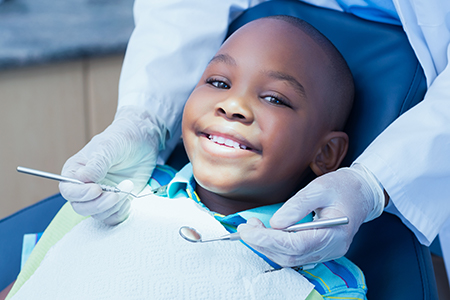At the office of Bahri Dental Group, the health and development of your child's smile are our top priorities. Our goals are to help children establish a strong foundation for a lifetime of good oral health and experience the benefits of healthy, beautiful smiles.

All parents want what's best for their families. When good oral care, including routine dental checkups, start at an early age, our office can closely monitor the development and health of your child's smile as they grow. It's essential to keep in mind that preventive dental care and timely treatment for any emerging dental issues not only helps to ensure ongoing oral health but also supports overall well-being, and contributes to a positive self-image.
You can rest assured that your child's smile is in the best of hands at our office! We provide gentle and precise care in an environment that's comfortable, warm, and engaging. At the office of Bahri Dental Group, we offer a comprehensive range of dental services designed to address the dental needs of children of all ages. Whether it's your little one's first trip to the dentist, a routine visit, treatment for a dental emergency, or more, we're well equipped to provide the dental care that's needed.
We take a proactive approach and emphasize the importance of dental prevention as the key to good oral health. We provide you and your child with the resources as well as the tools to establish an effective brushing and flossing routine and offer nutritional guidance and advice on potentially harmful oral habits. Our entire team strives to make each visit with your child a positive, informative, and beneficial experience.

Studies show that children and teens lose an estimated 51 million school hours each year to dental problems. To help your child maintain optimal oral health and a smile that's healthy and bright, we recommend dental checkups and cleanings twice a year.
As skilled and compassionate providers of dental care, we understand all aspects of dental development and are sensitive to the unique needs of children. At each periodic exam, a member of our professional team will review your child's medical and dental history and then perform a thorough clinical assessment of the teeth, gums, jaws, and the surrounding oral tissues. We'll also check your child's bite, jaw alignment, and function.
Because it's vital to see what's going on below the surface, we'll take digital radiographs as needed, to check for the presence of any cavities, or infection and to evaluate the position of your child's developing teeth and the health of jaw bone. We'll also perform a professional dental cleaning to eliminate any plaque or debris that has accumulated between the teeth or in hard to reach places.
At every stage of your child's development, we'll advise you on the most effective methods of keeping his or her teeth clean and discuss the foods, beverages, and harmful oral habits that can lead to problems. While it can be difficult sometimes to get children into a regular oral hygiene routine, we'll give you tips and advice on how to make brushing and flossing a fun part of their daily activities. As your trusted partner you can rely on the office of Bahri Dental Group to keep a close watch on your child's oral health and development.
Establishing a dental partnership when your child is small
Keeping your baby's and toddler's teeth clean
Not allowing your baby to sleep with a bottle of milk or juice.
Bringing your child to the dentist for routine checkups and dental care
Leading by example and encouraging the recommended tooth brushing and flossing routine
Promoting wise dietary choices and healthy snacking, including replacing sugary drinks with water and limiting sweets
Providing supportive guidance to help your child put away their pacifier and stop thumb or finger sucking at the appropriate time
Making sure your child wears a mouthguard when playing specific sports

Even before your child is born, your little one's first set of teeth is already forming. As a matter of fact, by the time your baby is a year old, some of the front teeth will have already emerged into place. For this reason, it's essential to establish a dental care routine at an early age. As per the recommendations of the American Dental Association and the American Academy of Pediatric Dentistry, parents are encouraged to have their baby see the dentist around the time of their first birthday.
Childhood is a time of incredible physical and emotional changes. As kids go through several stages of development, so do their teeth. Many things, including both genetic and environmental factors, contribute to the health and appearance of your child's smile. While some issues cannot be prevented, there's still a lot you can do to help ensure your child experiences optimal oral health and develops an attractive, functional smile. Our office will make sure your children are instructed in the best methods for caring for their teeth and will provide them with useful, age-appropriate information on following a healthy diet as well as make them aware of which oral habits and activities may be harmful to their teeth and overall well being.
In addition to checking for the presence of dental disease, we also monitor your child's facial growth, jaw development, and alignment of their smile. If orthodontic treatment is indicated, we'll advise you of our recommendations for dental care. Since many children and teens wear braces, paying extra attention to what they eat and how they maintain their oral hygiene is of the utmost importance.
Beyond good oral hygiene and routine dental care, a balanced, nutritious diet is essential for a healthy smile in a growing child. Sticky, sugary foods and drinks are not only harmful to children's oral health but also detrimental to their overall well-being. A diet rich in nutrients is critical for optimal growth and development and keeping the teeth and gums strong.
The American Dental Association and the American Academy of Pediatric Dentistry recommend a child's first dental visit by their first birthday or within six months of the eruption of the first tooth. Early visits allow the dental team to evaluate growth, identify potential concerns, and establish a positive routine so visits become familiar and comfortable. The initial appointment typically focuses on a gentle exam, demonstration of home care, and guidance for parents on feeding, pacifier use, and oral hygiene.
Parents can expect the dentist or hygienist to review medical and dental history, perform a visual exam, and answer questions about development and prevention. If any immediate concerns are identified, the clinician will explain appropriate next steps and scheduling for follow-up care. Establishing this early partnership helps set the foundation for lifelong oral health and timely intervention when needed.
For most children, routine dental exams and professional cleanings every six months are recommended to monitor development and prevent disease. These periodic visits let the dentist assess tooth eruption, examine for cavities, evaluate oral habits, and provide age-appropriate hygiene instruction. The frequency may be adjusted based on a child's caries risk, orthodontic needs, or medical conditions.
During a checkup the team will perform a clinical exam and take digital radiographs when necessary to see areas between teeth and evaluate developing tooth roots. Professional cleanings remove plaque and tartar that are difficult to address at home and allow the clinician to apply preventive measures such as topical fluoride when indicated. Regular visits also create opportunities to counsel families on nutrition, oral habits, and injury prevention.
Begin oral care before teeth erupt by gently wiping the infant's gums with a clean, damp cloth after feedings to remove bacteria and sugars. Once teeth appear, use a soft infant toothbrush with a smear of fluoride toothpaste roughly the size of a grain of rice, and gently brush twice daily, focusing on the gum line and all tooth surfaces. Supervise brushing until your child has the manual dexterity to do a thorough job, which is often around six to eight years of age.
Avoid putting your baby to bed with a bottle containing milk, formula, or juice to reduce exposure to sugars that cause decay. Encourage drinking from a cup as developmentally appropriate and offer water between meals to help rinse the mouth. Maintain regular dental visits so the team can reinforce home care techniques and make personalized recommendations.
Teething is a normal developmental milestone that commonly begins around six months but can vary widely; symptoms may include drooling, gum tenderness, irritability, and disrupted sleep. Nonmedicated methods to soothe gums include offering a chilled (not frozen) teething ring, massaging the gums with a clean finger, or using a cool washcloth. Over-the-counter topical numbing agents are generally not recommended without professional guidance.
If teething symptoms are severe, accompanied by high fever, prolonged diarrhea, or other concerning signs, contact your child's pediatrician or dentist for evaluation. Routine dental care remains important during teething to monitor eruption patterns and oral comfort. The dental team can also provide reassurance and safe strategies for soothing your child through the teething period.
Cavity prevention relies on consistent home care, a balanced diet, and regular professional care; brush twice daily with fluoride toothpaste and floss once teeth contact each other. Limit sugary snacks and drinks, replace them with water or milk, and encourage meals and snacks at set times rather than constant grazing. Avoid prolonged exposure to sugary liquids in bottles or sippy cups, and do not dip pacifiers in sweet substances.
In the dental office, clinicians assess caries risk and may recommend preventive measures such as topical fluoride applications and dental sealants on permanent molars when appropriate. Sealants provide a protective barrier over grooves where food and bacteria commonly accumulate. Open communication with your dental team will help tailor a prevention plan that fits your child's needs and lifestyle.
Dental sealants are a thin, protective coating applied to the chewing surfaces of molars and premolars to block bacteria and food particles from settling in grooves and pits. Sealants are most commonly placed on newly erupted permanent molars and premolars, often between ages 6 and 14, when the risk of decay is higher and the anatomy is vulnerable. The application is painless, quick, and usually performed during a routine visit.
Sealants can significantly reduce the risk of cavities in treated teeth and may be checked and refreshed at regular dental appointments. They are one component of a comprehensive prevention strategy that also includes fluoride, good oral hygiene, and dietary measures. Your child's dentist will recommend sealants based on individual risk factors and dental development.
Thumb sucking and pacifier use are common self-soothing behaviors in infants and young children and usually do not cause dental problems when they stop before the age of 4 to 5. Persistent sucking beyond preschool years can affect the alignment of the teeth and the development of the jaws, and may influence speech and swallowing patterns. If a habit continues as permanent teeth begin to erupt, discuss strategies with your dental team to minimize long-term effects.
The dentist can evaluate any dental changes and recommend positive reinforcement techniques, habit reminders, or appliances in more resistant cases. Early, gentle intervention and parental support increase the chances of successful cessation. If orthodontic concerns arise as a result of prolonged sucking, the dental team will explain appropriate timing and options for correction.
The American Association of Orthodontists recommends that all children have an orthodontic evaluation by age 7 so a specialist can identify developing concerns early. At this age many bite and jaw problems can be detected while some growth remains, allowing for timely monitoring or early intervention when indicated. Not every child will need active treatment at that stage, but surveillance helps plan the optimal time for any future care.
Your primary dentist will also monitor facial growth and tooth alignment during routine exams and refer to an orthodontist when appropriate. Early assessment can simplify later treatment in some cases or confirm that watching and waiting is the best approach. When orthodontic treatment is needed, the team will discuss goals, timing, and how to coordinate care with general dental needs.
Common pediatric dental emergencies include severe tooth pain, a knocked-out permanent tooth, broken or chipped teeth, and soft tissue injuries; timely action improves the likelihood of a good outcome. For a knocked-out permanent tooth, handle it by the crown, rinse gently with water if dirty, and attempt to reinsert it if possible, or store it in milk or saline while seeking immediate dental care. Do not reimplant knocked-out primary (baby) teeth; instead, bring the child to the dentist for evaluation to prevent damage to developing permanent teeth.
For severe pain, swelling, or bleeding that will not stop, contact dental care promptly and seek emergency medical attention if breathing or swallowing are affected. You can reach the office of Bahri Dental Group at (904) 456-0052 for urgent guidance and to arrange prompt evaluation when appropriate. Keeping a small first-aid kit, knowing your child's dental history, and calling ahead can help the dental team prepare the right care quickly.
A balanced diet rich in calcium, phosphorus, vitamin D, and other nutrients supports strong teeth and healthy jaw development while reducing the risk of decay. Frequent consumption of sugary or sticky foods and sweetened beverages increases acid attacks on tooth enamel and raises cavity risk, especially when these items are consumed between meals. Offering water between meals, encouraging healthy snacks like fruits and vegetables, and limiting juice and sports drinks help protect teeth.
Meal timing matters because saliva production during meals helps neutralize acids and clear food debris, whereas continuous snacking prolongs acid exposure. Parents should seek guidance from the dental team and pediatrician to design a nutrition plan that supports overall growth and oral health. Reinforcing healthy eating habits early helps establish patterns that protect the smile as children grow.
Our goal is to help every patient experience the benefits of good oral health and a beautiful smile. We value the trust you have placed in our office and strive to provide solutions that meet your dental and orthodontic needs and expectations of care.

Phone